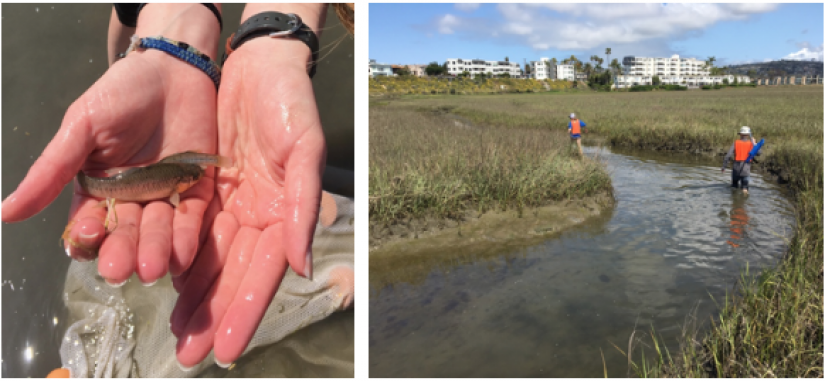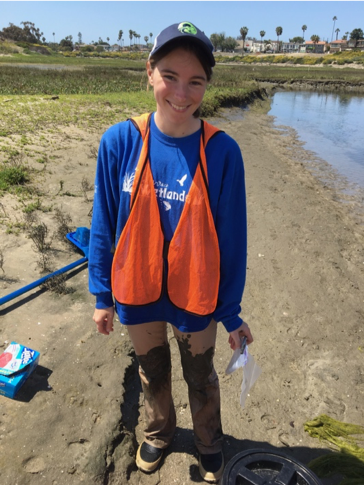Climate change is a reality - and an emergency. As a California Sea Grant state fellow, I have spent the last year surrounded by it: working on related policy, watching it, reading it, discussing it, living it—and grieving it.
The crisis
I studied the contents of fish guts for my master's research at the University of San Diego. More accurately, I studied differences in the diet of the California Killifish, Fundulus parvipinnis, between a natural and created salt marsh habitat in Mission Bay, San Diego.

Climate change was never a significant component of my research, but more of an accessory. For example, sea-level rise will likely impact the community structure of coastal habitats, like salt marshes.
Climate change wasn't a focus of my work, but I was both aware and concerned about its impacts. This concern transformed into an almost overwhelming presence as I began to understand the full scope and challenges of addressing climate change through my work as a California Sea Grant state fellow with California State Lands Commission. Climate change was no longer an accessory to my work, but the whole ensemble, embedded into every aspect. It was no longer just a concern but a crisis.
Climate grief
My fellowship with State Lands centers on environmental justice and climate change. These issues, individually, are significant. They highlight the urgency and intricate complexities of addressing, mitigating, and adapting to climate impacts.

Since February 2019, I have had the opportunity to familiarize myself with in-depth analyses of current climate science and learn about historic environmental injustices in communities of color and the poor due to government policies, programs, and actions. The intersection between these is that climate change is and will disproportionately impact and continue to exacerbate existing environmental injustices in communities of color and the poor.
Inaction on climate change is deadly. And yet, action is slow-moving. Working in policy, you quickly realize that all action (on any matter) can take time, but with climate change, that time comes at a high cost: lives.
It doesn’t stop at work.
The climate crisis follows you home, on the news, in articles and literature, on social media, and in conversations.
The emotional toll for being surrounded and consumed by this information is high. It can cause stress and anxiety. In 2017, the American Psychological Association released a report, “Mental Health and Our Changing Climate,” outlining the mental health impacts associated with climate change. Climate grief is prevalent, pervasive – and overwhelming. But I have learned that it doesn’t have to lead to hopelessness. Addressing my grief and focusing on action has helped me sustain my passion for the work I love doing.
Focusing on action
Climate grief can feel overwhelming and suffocating. I have found the following actions helpful for addressing my climate anxiety and grief:
1. Address your climate grief
Take time to process your grief. Allow yourself to feel sadness, anger, and fear. These are not illogical nor unwarranted feelings, and you deserve the space to process them.
I have found it incredibly helpful to talk with colleagues and friends who also work on climate change-related issues.
2. Focus on your capacity
Individual actions are important, but they are not the solution. Addressing climate change requires systems to change dramatically. So, don't feel guilty if you use a car as your primary transportation or have to fly for work occasionally.
Instead, feel proud of the small or large actions you CAN do. For example, I started composting at home to reduce my food waste, and I try to avoid plastic at the grocery stores. I also use my voice to advocate for policy action. Civic engagement is crucial to addressing climate change.
I know I can't do everything, but I can do something. And those somethings empower me to feel hope.

3. Build relationships
Everyone has a lot on their plate, and climate change is not always going to be the priority on all plates. For example, avoiding single-use plastic might be unrealistic for some due to time, location, and financial constraints. Remember - addressing climate change requires system changes.
It is more important to build relationships with people than to tell them what climate actions to take. Take time to start conversations and actively engage others. I enjoy connecting with friends and family on social media about climate change and sustainability.
4. Take a walk outside
Like many state fellows, I find solace in the field and especially in the mud. Unfortunately, there is no mud in my cubicle. So, when I need to recover my inspiration and remind myself why this work matters, I take a walk outside.